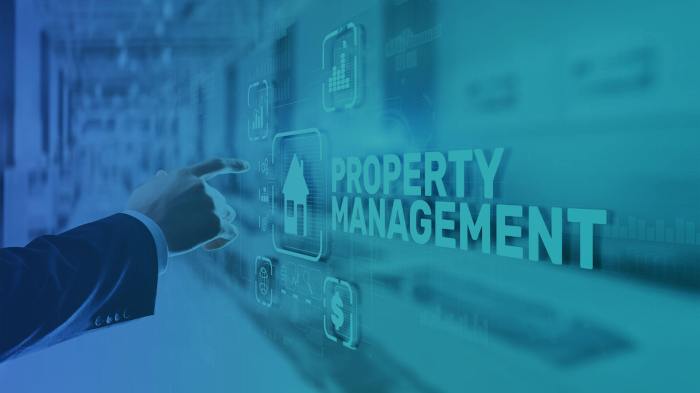Delving into the realm of AI property management, we uncover the innovative ways in which artificial intelligence is reshaping the landscape of real estate management. From streamlining processes to enhancing efficiency, AI is at the forefront of transforming property management practices.
Providing a detailed look at the various facets of AI in property management, this discussion aims to shed light on the benefits and applications of this cutting-edge technology in the real estate sector.
Overview of AI in Property Management
Artificial Intelligence (AI) in property management refers to the use of advanced technology and algorithms to automate various tasks and processes involved in managing properties. AI is revolutionizing the property management industry by streamlining operations, improving efficiency, and enhancing overall tenant experience.
Benefits of AI in Property Management
- Enhanced Efficiency: AI can automate routine tasks such as rent collection, maintenance requests, and tenant communication, allowing property managers to focus on more strategic activities.
- Improved Decision-Making: AI algorithms can analyze vast amounts of data to provide valuable insights for property managers, helping them make informed decisions related to pricing, marketing, and property maintenance.
- Enhanced Tenant Experience: AI-powered chatbots and virtual assistants can provide round-the-clock assistance to tenants, addressing their queries and concerns promptly, leading to higher tenant satisfaction.
- Cost Savings: By automating processes and optimizing resources, AI can help property managers reduce operational costs and maximize profitability.
- Predictive Maintenance: AI can predict maintenance issues before they occur by analyzing historical data and trends, enabling property managers to address potential problems proactively.
Applications of AI in Property Management
AI technology has revolutionized the property management industry, offering innovative solutions to streamline operations and enhance efficiency. From property maintenance to tenant screening and rental pricing strategies, AI applications are reshaping the way properties are managed and optimized.
AI in Property Maintenance
AI-powered tools and platforms are being utilized to automate property maintenance processes, ensuring timely inspections, repairs, and upkeep. By analyzing historical data and predictive analytics, AI can identify potential maintenance issues before they escalate, ultimately reducing costs and minimizing downtime.
AI Tools for Tenant Screening and Selection
AI algorithms are being employed to streamline the tenant screening process, analyzing applicant data and generating insights to identify reliable tenants. These tools can assess credit scores, rental history, and background checks efficiently, enabling property managers to make informed decisions and reduce the risk of leasing to problematic tenants.
Optimizing Rental Pricing Strategies with AI
AI technology can analyze market trends, demand patterns, and competitor pricing to optimize rental pricing strategies. By leveraging machine learning algorithms, property managers can set competitive rental rates, maximize occupancy rates, and improve overall revenue generation. This data-driven approach ensures that properties are priced accurately, attracting tenants while maximizing profitability.
Data Management in AI Property Management

Effective data management is crucial in AI-driven property management as it allows for the collection, analysis, and utilization of property-related information to enhance decision-making processes and operational efficiency.
Role of Data Collection in AI-driven Property Management
- Data collection in AI property management involves gathering information from various sources such as IoT devices, sensors, tenant profiles, maintenance records, financial data, and market trends.
- The collected data is then processed and analyzed by AI algorithms to identify patterns, trends, and insights that can help optimize property operations, improve tenant experiences, and maximize revenue.
Importance of Data Analytics for Property Performance Evaluation
- Data analytics plays a vital role in evaluating property performance by providing real-time insights into key performance indicators (KPIs) such as occupancy rates, rental yields, maintenance costs, and tenant satisfaction levels.
- By leveraging data analytics, property managers can make data-driven decisions, forecast trends, identify areas for improvement, and implement strategies to enhance overall property performance and profitability.
Insights on How AI Handles Large Volumes of Property-related Data
- AI algorithms are designed to handle large volumes of property-related data efficiently by utilizing advanced data processing techniques such as machine learning, natural language processing, and predictive analytics.
- These algorithms can quickly analyze massive datasets, extract relevant information, and generate actionable insights to support property management tasks such as predictive maintenance, demand forecasting, and risk management.
AI Tools and Technologies for Property Management
AI tools and technologies have revolutionized the way property managers operate, providing innovative solutions to streamline processes and enhance efficiency in property management operations.
Popular AI Tools Used by Property Managers
- IBM Watson: Utilized for data analysis, predictive maintenance, and tenant interaction.
- Yardi: Offers AI solutions for lease management, rent collection, and financial reporting.
- ChatGreet: AI chatbot platform for tenant communication, answering queries, and scheduling maintenance requests.
Comparison of Different AI Technologies for Maintenance Scheduling
- Machine Learning Algorithms: Analyze historical maintenance data to predict future maintenance needs and schedule proactive repairs.
- Predictive Analytics: Utilize data patterns to forecast equipment failures and prevent maintenance issues before they occur.
- Natural Language Processing: AI technology used to understand tenant maintenance requests and schedule appropriate service appointments.
Integration of AI Chatbots for Tenant Communication
AI chatbots are increasingly being integrated into property management platforms to enhance tenant communication and provide instant responses to queries. These chatbots can schedule maintenance requests, provide lease information, and offer real-time support to tenants, improving overall tenant satisfaction and operational efficiency.
Closing Notes
In conclusion, the integration of AI in property management represents a paradigm shift in the industry, offering unprecedented opportunities for growth and optimization. As we look ahead, the future of real estate management is undeniably intertwined with the advancements in artificial intelligence, promising a more efficient and effective approach to property operations.
Frequently Asked Questions
How can AI benefit property managers?
AI can automate tedious tasks, enhance decision-making processes, and optimize property performance, ultimately increasing efficiency and reducing operational costs.
What are some common AI tools used in property management?
Popular AI tools include predictive maintenance software, AI-powered chatbots for tenant interactions, and data analytics platforms for performance evaluation.
How does AI handle large volumes of property-related data?
AI utilizes advanced algorithms and machine learning techniques to process and analyze vast amounts of data, providing valuable insights for property managers.









